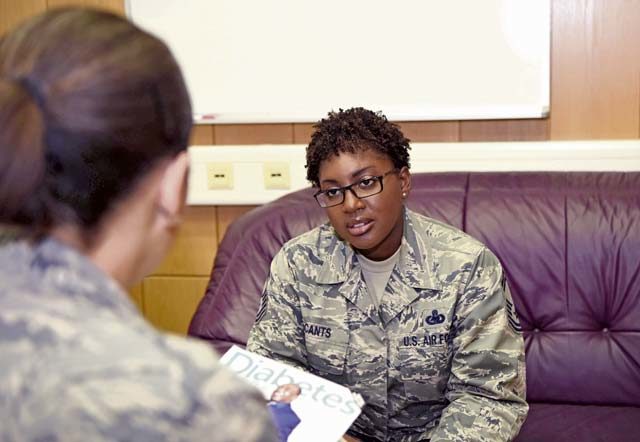
According to the American Diabetes Association, 1.25 million American children and adults have type one diabetes.
One of them is Senior Master Sgt. Denise McCants, 86th Logistics Readiness Squadron superintendent of operations compliance flight.
She sat down to share her experiences and advice in dealing with diabetes in the Air Force to help raise awareness about American Diabetes Month which is commemorated every November.
The Mayo Clinic reports weight and inactivity to be the primary risk factors leading to diabetes so as an active member in the Air Force, McCants was taken by surprise when diagnosed with the disease in 2016.
“We have type two diabetes that runs in my family but type one diabetes is a very rare autoimmune disease so we were all pretty shocked by the news when I got my diagnosis,” McCants said. SMSgt McCants has a form of diabetes referred to as Latent autoimmune diabetes of adults (aka LADA). LADA is a form of diabetes that occurs in adulthood, often with a slower onset of type one diabetes diagnosed in children. According to medical officials, adults with LADA may initially be diagnosed incorrectly as having type two diabetes based on their age, particularly if they have risk factors for type two diabetes such as a strong family history or obesity. The diagnosis of LADA is typically confirmed once the patient is referred to a specialist.
Prior to her diagnosis, McCants did not attribute symptoms, such as confusion and dizziness, to diabetes. She felt it was most likely due to stress so it went undiagnosed for some time. When she was diagnosed, her blood sugar levels were briefly 1,000 milligrams per deciliter before being normalized. Average blood sugar levels generally read between 100 to 180 mg/dL.
Capt. Mumbi Ngugi, 86th Medical Operations Squadron physician assistant, said a prolonged high blood sugar level can result in complications such as stroke, heart attack, kidney problems, blindness, and even amputation. For this reason it is vital for individuals to be seen by a medical professional as earlya as possible should they feel any of these symptoms for a prolonged duration.
Ever since the diagnosis, however, McCants has been proactive in her diabetes management.
“McCants has been a model patient, embracing this rare diagnosis fully and living her life to the fullest,” Ngugi said. “She is always with a smile, knows when to seek help, is very compliant with care and is a role model for people living not only with diabetes but other chronic ailments as well.”
McCants believes the key to managing diabetes is by having a strict schedule. Without a strict schedule and regular monitoring two things may occur. Too high of a blood sugar level can result in serious health complications but too much insulin, resulting in too low of a blood sugar level, can result in a patient passing out and falling into a coma.
“For these reasons it is imperative for people with type one diabetes to get enough sleep because if you don’t get enough sleep your blood sugar will spike,” McCants said. “If you don’t eat properly and at scheduled times your blood sugar will spike. On the other hand, if you don’t eat enough your blood sugar will be too low. So, if your diet and sleep does not have structure it will be very hard for you to accurately measure how much insulin you might need, which can be dangerous.”
Although there are some obstacles to overcome, according to Ngugi, Air Force members that may have this condition are reminded a type two diabetes diagnosis is a currently retainable condition as per the Medical Standards Directory guidance. Even though type one diabetes is currently not a retainable condition, all final medical retainability decisions are made on a case-by-case basis by the Air Force Personnel Center.
Patients with conditions like McCants are able to lead normal lives.
“No matter what your circumstances are you can overcome it and you don’t have to let the disease control you.”







